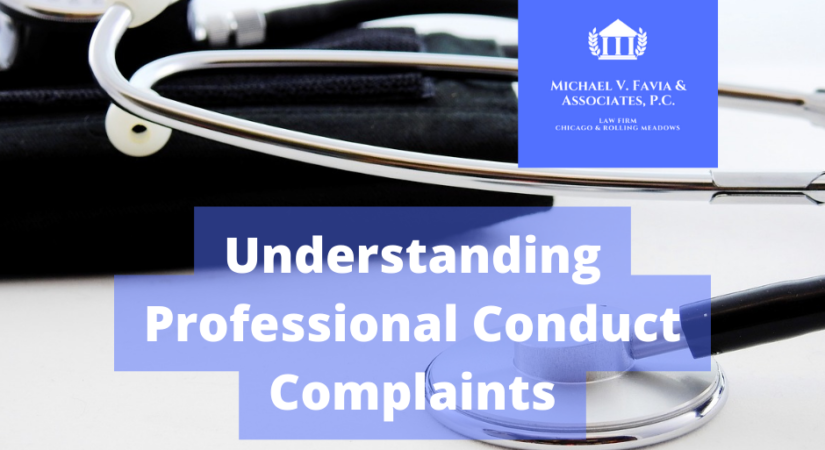Explanations and Tips From a Chicago IDFPR Defense Attorney
When patients entrust their health to a physician, they expect professional and ethical behavior. However, complaints against physicians occur, and the most common complaint filed with the Illinois Department of Financial and Professional Regulation (IDFPR) is “unprofessional conduct.” This blog post aims to provide a comprehensive overview of this issue, including what constitutes unprofessional conduct, the role of the IDFPR, and the implications for physicians in Illinois. Learn why the most common complaint against Illinois physicians involves allegations of unprofessional conduct and what licensees can do to defend against complaints.
The Value of Hiring an Experienced Chicago IDFPR Attorney, Michael V. Favia
Navigating the complexities of an IDFPR complaint can be daunting for any healthcare professional. Hiring an experienced attorney like Chicago IDFPR Defense Attorney Michael V. Favia can make a significant difference in the outcome of your case. Michael V. Favia & Associates, P.C. brings extensive knowledge and experience in dealing with IDFPR regulations and proceedings. With a deep understanding of the legal landscape in Illinois, Michael V. Favia provides invaluable assistance in preparing a strong defense, ensuring that all necessary documentation is accurately compiled, and representing you effectively in hearings. His expertise helps mitigate potential disciplinary actions but also aids in protecting your professional reputation and career. Whether you face allegations of unprofessional conduct or need guidance on compliance with IDFPR regulations, Michael V. Favia offers the legal acumen and dedicated support necessary to navigate these challenges successfully.
What Constitutes Unprofessional Conduct?
Unprofessional conduct encompasses a broad range of behaviors that violate professional standards. According to IDFPR guidelines, the following are some common examples:
Inappropriate Behavior Towards Patients or Colleagues
– Verbal or physical abuse
– Sexual harassment
– Disrespectful communication
Substance Abuse
– Use of drugs or alcohol that impairs the physician’s ability to practice safely
Fraud
– Falsifying patient records
– Insurance fraud
Billing Irregularities
– Overbilling or upcoding
– Charging for services not rendered
Conflicts of Interest
– Referral to facilities in which the physician has a financial interest without disclosure
Boundary Violations
– Engaging in personal relationships with patients
The Role of the Illinois Department of Financial and Professional Regulation (IDFPR)
The IDFPR is a state agency that oversees the licensure and discipline of healthcare practitioners, including physicians, nurses, and dentists. It plays a crucial role in maintaining the standards of the medical profession in Illinois.
Curious about IDFPR enforcement actions? Use this link for recent IDFPR enforcement reports.
Functions of the IDFPR
– Licensing: Ensuring that only qualified individuals are granted licenses to practice.
– Investigation: Examining complaints and allegations of misconduct.
– Discipline: Taking appropriate action against practitioners who violate professional standards.
Authority of the IDFPR
The IDFPR has the power to:
– Suspend or revoke licenses
– Impose fines
– Mandate corrective actions, such as additional training or monitoring
Filing a Complaint with the IDFPR
Patients can file complaints from insurance companies and other healthcare professionals or even anonymously online. However, anonymous complaints may pose challenges for the IDFPR in proving violations due to the need for more identifiable evidence.
Process of Filing a Complaint
1. Submission: Complaints can be submitted online through the IDFPR website.
2. Review: The IDFPR reviews the complaint to determine if it falls within its jurisdiction.
3. Investigation: An investigation is initiated if the complaint is valid.
4. Resolution: The IDFPR decides on the appropriate disciplinary action based on the findings.
Statute of Limitations for IDFPR Complaints
Under the Illinois Dental Practice Act (225 ILCS 25/23(40)), for example, and for illustrative purposes, the IDFPR must initiate proceedings to suspend, revoke, or take disciplinary action within five years after receiving a complaint or notice of an alleged violation. This statute of limitations underscores the importance of timely reporting and addressing issues of unprofessional conduct. It is important to ask your IDFPR defense attorney about these important issues.
Implications for Physicians
Facing an IDFPR complaint can have significant consequences for a physician’s career. Physicmusted to understand the gravity of such complaints and take proactive steps to maintain professional standards.
Preventative Measures
– Continuous Education: Engaging in ongoing professional development and ethics training.
– Clear Communication: Maintaining open and respectful communication with patients and colleagues.
– Proper Documentation: Ensuring accurate and thorough documentation of patient interactions and treatments.
– Seeking Help: Addressing substance abuse or mental health issues proactively.
Responding to a Complaint
– Legal Representation: Hiring an experienced attorney, such as those at Michael V. Favia & Associates, P.C., can help navigate the complexities of IDFPR investigations.
– Cooperation: Being cooperative and transparent during the investigation process.
– Corrective Actions: Taking any recommended corrective actions seriously to demonstrate commitment to professional standards.
Contact Chicago IDFPR Attorney Michael V. Favia for Consultations and Legal Defense
Unprofessional conduct is the most common complaint against Illinois physicians, and the IDFPR plays a vital role in regulating and disciplining healthcare practitioners. For physicians, understanding what constitutes unprofessional conduct and the processes involved in handling such complaints is crucial. At Michael V. Favia & Associates, P.C., our team is dedicated to assisting healthcare professionals in navigating these challenges and maintaining the highest standards of professional conduct.
For more information or to seek legal assistance, contact Michael V. Favia, a seasoned Chicago lawyer, who can provide the guidance and support needed in these complex situations.

